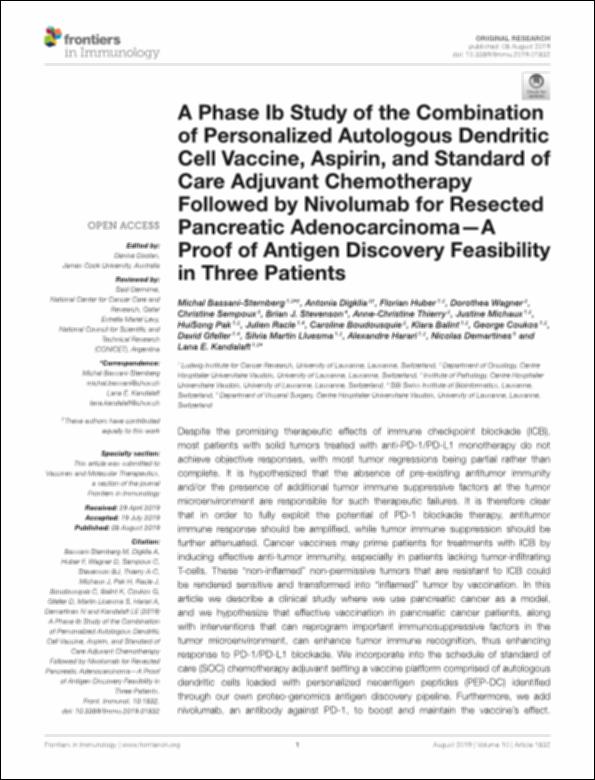Por favor, use este identificador para citar o enlazar este ítem:
http://hdl.handle.net/10637/15066A Phase Ib Study of the Combination of Personalized Autologous Dendritic Cell Vaccine, Aspirin, and Standard of Care Adjuvant Chemotherapy Followed by Nivolumab for Resected Pancreatic Adenocarcinoma-A Proof of Antigen Discovery Feasibility in Three Patients

Ver/Abrir:
Phase_Ib_Bassani_et_al_Fron_Inm_2019.pdf
Acceso restringido
2,55 MB
Adobe PDF
Request a copy
| Título : | A Phase Ib Study of the Combination of Personalized Autologous Dendritic Cell Vaccine, Aspirin, and Standard of Care Adjuvant Chemotherapy Followed by Nivolumab for Resected Pancreatic Adenocarcinoma-A Proof of Antigen Discovery Feasibility in Three Patients |
| Autor : | Bassani Sternberg, Michal Digklia, A. Huber, F. Wagner, D. Sempoux, C. Stevenson, Brian J. Thierry, Anne Christine Michaux, Justine Pak, HuiSong Balint, Klara Gfeller, David Martín Lluesma, Silvia Dermatines, Nicolas Kandalaft, Lana E. Racle, Julien Boundousquie, Caroline Coukos, George Harari, Alexandre |
| Materias: | Pancreatic adenocarcinoma; Dendritic cell vaccine; Antigen discovery; Neoantigen; Cancer immunotherapy |
| Editorial : | Frontiers Media |
| Citación : | Bassani-Sternberg M, Digklia A, Huber F, Wagner D, Sempoux C, Stevenson BJ, Thierry AC, Michaux J, Pak H, Racle J, Boudousquie C, Balint K, Coukos G, Gfeller D, Martin Lluesma S, Harari A, Demartines N, Kandalaft LE. A Phase Ib Study of the Combination of Personalized Autologous Dendritic Cell Vaccine, Aspirin, and Standard of Care Adjuvant Chemotherapy Followed by Nivolumab for Resected Pancreatic Adenocarcinoma-A Proof of Antigen Discovery Feasibility in Three Patients. Front Immunol. 2019 Aug 8;10:1832. doi: 10.3389/fimmu.2019.01832. PMID: 31440238; PMCID: PMC6694698. |
| Resumen : | Despite the promising therapeutic effects of immune checkpoint blockade (ICB), most patients with solid tumors treated with anti-PD-1/PD-L1 monotherapy do not achieve objective responses, with most tumor regressions being partial rather than complete. It is hypothesized that the absence of pre-existing antitumor immunity and/or the presence of additional tumor immune suppressive factors at the tumor microenvironment are responsible for such therapeutic failures. It is therefore clear that in order to fully exploit the potential of PD-1 blockade therapy, antitumor immune response should be amplified, while tumor immune suppression should be further attenuated. Cancer vaccines may prime patients for treatments with ICB by inducing effective anti-tumor immunity, especially in patients lacking tumor-infiltrating T-cells. These “non-inflamed” non-permissive tumors that are resistant to ICB could be rendered sensitive and transformed into “inflamed” tumor by vaccination. In this article we describe a clinical study where we use pancreatic cancer as a model, and we hypothesize that effective vaccination in pancreatic cancer patients, along with interventions that can reprogram important immunosuppressive factors in the tumor microenvironment, can enhance tumor immune recognition, thus enhancing response to PD-1/PD-L1 blockade. We incorporate into the schedule of standard of care (SOC) chemotherapy adjuvant setting a vaccine platform comprised of autologous dendritic cells loaded with personalized neoantigen peptides (PEP-DC) identified through our own proteo-genomics antigen discovery pipeline. Furthermore, we add nivolumab, an antibody against PD-1, to boost and maintain the vaccine’s effect. We also demonstrate the feasibility of identifying personalized neoantigens in three pancreatic ductal adenocarcinoma (PDAC) patients, and we describe their optimal incorporation into long peptides for manufacturing into vaccine products. We finally discuss the advantages as well as the scientific and logistic challenges of such an exploratory vaccine clinical trial, and we highlight its novelty. |
| URI : | http://hdl.handle.net/10637/15066 |
| Derechos: | http://creativecommons.org/licenses/by-nc-sa/4.0/deed.es |
| ISSN : | 1664-3224 |
| Fecha de publicación : | 8-ago-2019 |
| Centro : | Universidad San Pablo-CEU |
| Aparece en las colecciones: | Medicina |
Los ítems de DSpace están protegidos por copyright, con todos los derechos reservados, a menos que se indique lo contrario.

